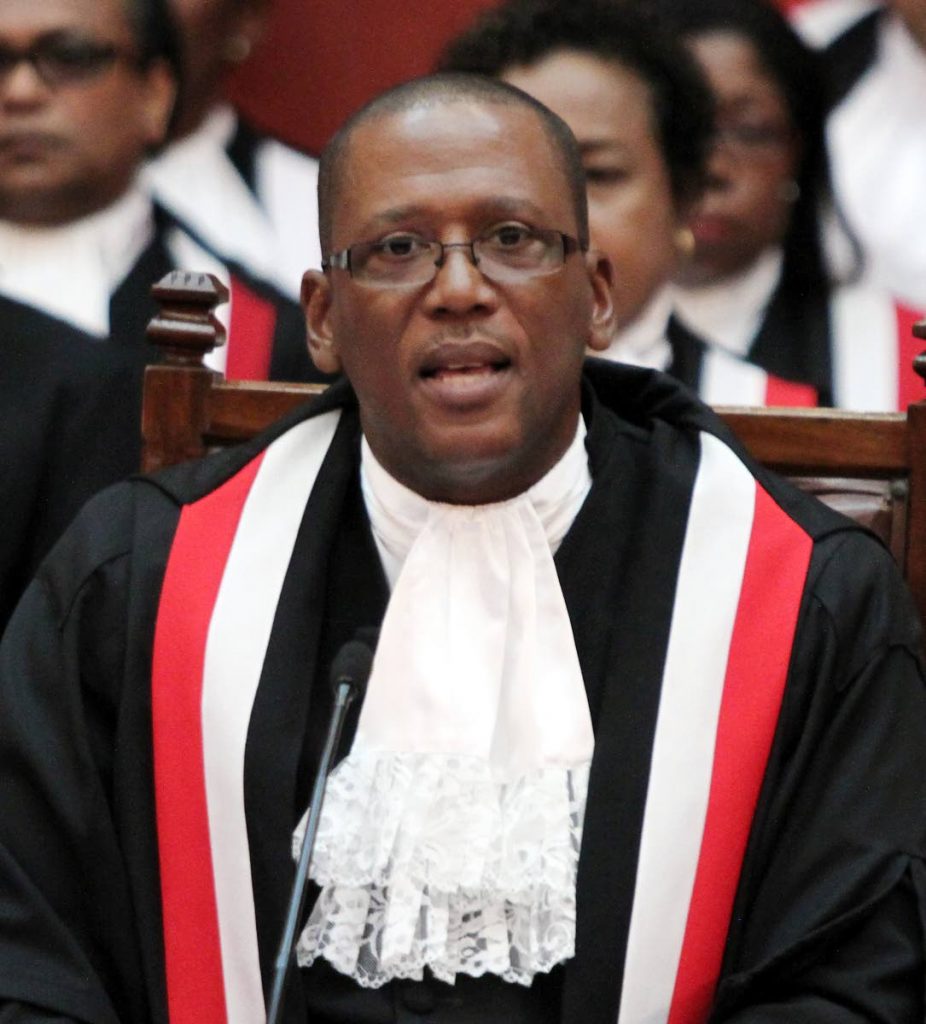'Sabbatical inappropriate'

JADA LOUTOO
THERE was no finalisation or adoption of any internal policy at the Judiciary to provide for sabbatical leave for judges.
And if any judge had the intention to make use of the facility, which was recommended by the Salaries Review Commission in its 98th report of November 13, 2013, they would have to give six months’ notice.
These requirements were contained in a “working document” formulated by a committee comprising Justice of Appeal Paula-Mae Weekes (as she then was), and Justices Charmaine Pemberton, Hayden St Clair-Douglas and Ricky Rahim.
Chief Justice Ivor Archie wrote to President Anthony Carmona on November 8 asking for a six-month sabbatical to “step back a bit from the onerous demand” of his position and to “rest, reflect and undertake a programme of study,” in Washington, DC.
He was expected to start today but has since agreed to defer his departure after a request from acting President Christine Kangaloo.
The deferment is to allow further communication over a concern raised by Prime Minister Dr Keith Rowley.
Several questions have been raised on the issue of sabbatical leave for judges, such as on what legal authority it was granted.
Judges have also asked when the facility was made policy, as they have never been told of it.
They have also questioned whether Justice Allan Mendonca was given notice that he would be made to act in the position of the head of the Judiciary for six months and given that the working document suggested that sabbaticals be considered on the basis of seniority.
Archie was made a High Court judge in 1998 and completed ten years of service as CJ in January.
There are several judges who have longer terms of service.
The judges have also asked, since the proposal for a sabbatical was subject to the exigencies of the job, how Archie could go away for six months if the Court of Appeal’s workload was heavy.
They have pointed to a decision on Friday by Justice of Appeal Prakash Moosai to set April for the urgent hearing of the Law Association’s appeal of Archie’s lawsuit to stop it continuing to investigate his conduct.
“Surely, given the current workload which now does not enable the listing of an urgent hearing for over 30 days, the timing of sabbatical is inappropriate,” one judge told Sunday Newsday.
In recent e-mail exchanges between the judges, one member of the sub-committee set up by Archie in 2014, Justice Ricky Rahim, responded to a query by Justice Carol Gobin about the policy for judges to access/apply for and consideration to be given to sabbatical leave. This was in February.
Rahim said a draft was submitted.
“Since that time, several others have come on board so perhaps it may be prudent to circulate the draft to those who were not among our number at the time. That is it as far as I know. I have no other update.”
Justice Weekes, who was chair of the committee, told judges on July 23, 2014 that the committee never actually met, since every attempt was thwarted by the unavailability of one or the other of the judges.
She added that the process therefore was an e-mail from herself to other members of the committee with an invitation to respond with any additions or comments they wanted to make.
“The correspondence went back and forth among the committee members with all but St Clair-Douglas J responding, I take St Clair-Douglas’s J absolute silent to signify apply for each and every proposal,” she said then.
She sent the document to all judges for their comments, adding that it was her intention to consolidate all contributions into a final document to be handed over at another meeting, which was carded for July 23, 2014, and warning them, “You know what I make of silence.”
Before the meeting, Justice of Appeal Peter Jamadar asked for more time to consider the recommendations of the committee, but Weekes said the discussions would take place at the planned meeting.
There was no formalisation or adoption of any policy at the July 23 meeting, sources said.
The working document for consideration noted that the SRC gave no start-up date and that “it appears that there is no bar to this condition taking immediate effect.”
Judges were to be eligible for sabbatical leave after seven years’ service but not within one year of their retirement.
At the time 19 judges, including the CJ, were eligible for sabbatical leave. While the document said the CJ was to give approval for sabbaticals, it was recommended that as far as practicable, priority should be determined by the length of service.
On the issue of timing, the document noted that if leave was granted to one judge at a time, it would take nine and half years for eligible judges to enjoy the facility.
“At first blush, it would seem most convenient to have one appellate judge and one high court judge on sabbatical leave at the same time.
“Consideration may also be given to short periods of overlapping at each level.”
The working document suggested that whatever course of study the judge chose to embark on during the sabbatical, it should not be so burdensome to contribute to their possible burnout. It was also the opinion of the CJ that the course of study should benefit the Judiciary.
An acting system was also recommended to cover the period any judge was on sabbatical.


Comments
"‘Sabbatical inappropriate’"